Move over 30 for 30, Coach is the new standard for sports documentaries. Following Tracy Hamm’s journey to gaining her UEFA A coaching license, the film appeared at a slew of festivals and picked up considerable buzz along the way. We sat down with Hamm and executive producer Courtney Carroll-Levinsohn to discuss the film and what effect they hope it has on American soccer.
For many people, self-funding and executive producing a documentary is the culmination of an idea or experience. But for Courtney Carroll-Levinsohn, it’s simply the continuation of her work with the Growth Through Sport program she founded.
Using GTS as her platform, Carroll-Levinsohn helps athletes of all ages to develop competitive and emotional skills to excel in sports. She’s also become increasingly focused on improving access to the game by helping coaches, educating parents, and empowering players — especially women.
That’s where Coach comes in. The inspiring short film follows Tracy Hamm on her journey to becoming one of the few women to earn a UEFA A coaching license.
“It started to be a sports psych film and the gender part was so unavoidable,” said Carroll-Levinsohn, who coached Hamm at Cal Berkeley and has a master’s degree in sports psychology. “I made Coach to become a tool to inspire young women to go into coaching.”
Carroll-Levinsohn looked to highlight both the invisible and overt obstacles Hamm faced as a woman navigating the world of coaching. At times emotionally moving and at other times frustrating (there’s a scene with one of Hamm’s peers mansplaining tactics to her), Coach takes aim at normalizing women as coaches and in positions of authority in soccer.
Through her short film, Carroll-Levinsohn creates a call to action. She’s looking to flip American soccer culture on its head and build a movement to provide a space for women to exist and thrive in the sport.
“There’s a real void in keeping girls in soccer by understanding what drives and motivates them,” Carroll-Levinsohn said. “And it’s not results, it’s not your record, it’s not your trophies. But you don’t have women coaching them, so they think that it is. And when they don’t measure up to that it sucks and it creates anxiety and depression and withdrawal from the game in a very real way.”
In addition to Carroll-Levinsohn, we also caught up with the film’s titular character, Tracy Hamm, for a detailed discussion about her experience getting her coaching license, the coaching philosophy she’s developed, and how allies within the soccer community can lead to change and help female coaches.
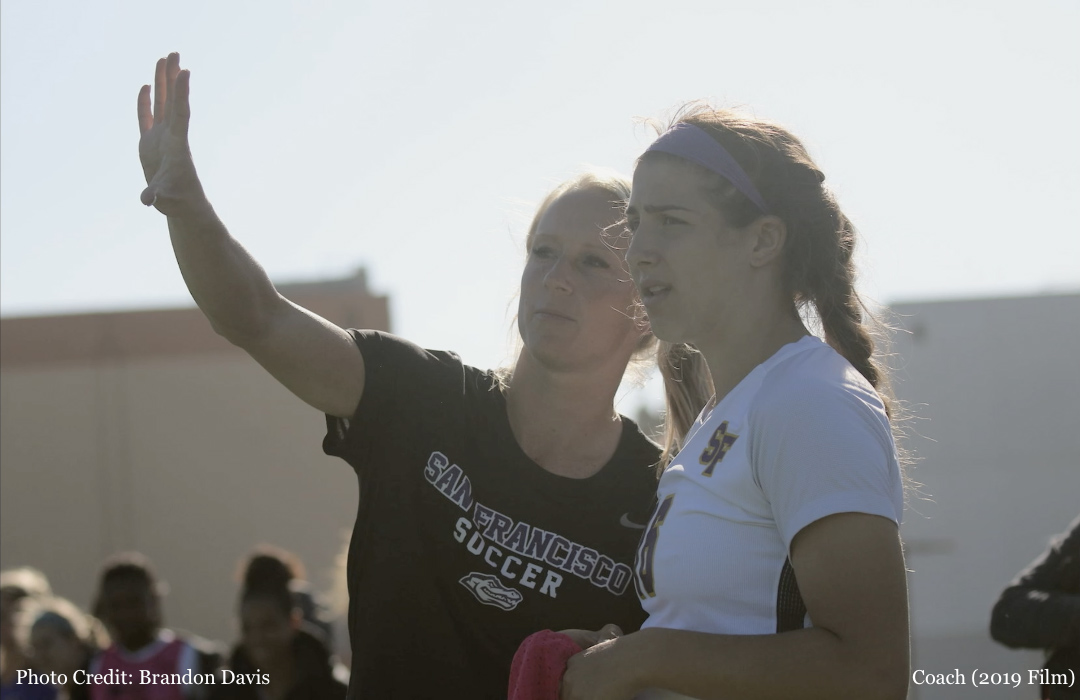
Urban Pitch: When did you realize you wanted to be a coach and pursue coaching as a full-time career?
Tracy Hamm: When I was done playing pro, so my second season in Atlanta. I started to realize I was thinking about the game in a much different way. I was considering different formations and asking myself questions — why aren’t we playing in this system and looking at this 1v1 matchup, or, it makes way more sense for her to be playing the seven and not the 10 — and really thinking about the game in a very different way, from a different perspective. For me that was a pretty clear indication I was ready to hang up my boots as a player and focus more on my development as a coach.
Going through the process of getting my master’s, I realized I was going to be a lot more effective after understanding how to build culture and establish consistency and communication and all the things that are the intangibles that go into building a program. I thought I wanted to be a sports psychologist and realized I needed to be on the field. And being a coach and being on the field with my team just is such a passion of mine. So, that’s where I decided coaching was something I wanted to do 100 percent, and it’s something I want to do the rest of my life moving forward.
Can you talk about your experience in Wales during the in-person portion of getting your UEFA A license? What was the most important thing you learned throughout that whole experience?
Well, outside of learning way more about the Xs and the Os and the tactics and just how European soccer is so dominant, obviously especially on the men’s side, I think what I learned most is actually about myself and being able to put myself in an environment that was really challenging and coming out better on the other side.
It gave me a lot of confidence moving forward in terms of seeking out opportunities to really challenge myself because I felt so much personal and professional growth having gone through that experience. It really gave me that extra push to pursue other opportunities and just be vulnerable. And that’s something that’s really difficult as a coach.
I’m someone that’s very stoic, and it’s hard. I have very thick skin, and it’s hard to be vulnerable a lot of the time, but when I was in that environment and in that experience, you’re exposed. Your deficiencies and things you don’t know about yourself or about the game are highlighted. And when I learned and developed and went through that process, I realized I certainly can do anything I put my mind to and really just expand my horizons.
Can you tell me about the coaching philosophy you’ve developed over the years? Do you have your teams try to emulate how you played as a player or do you subscribe to a certain coaching philosophy? Or is it a mix of both?
I am definitely a player-centered coach in terms of how I communicate. One of the most important things is consistency. My teams know what I’m looking for because I constantly reinforce our standards and values. They know the expectations on and off the field. I believe in the holistic development of student-athletes on and off the field and try to use the game of soccer as a medium for being and becoming a good, hard working, ambitious, and empowered woman.
Teams often are a reflection of their leader, so I focus a lot on how I carry myself and my demeanor. How I do anything is how I do everything. Of course, players have different roles and conditions than coaches, but I certainly don’t ask them to do things that I don’t value or think are important. There is always a plan and reason behind everything I do and everything I say.
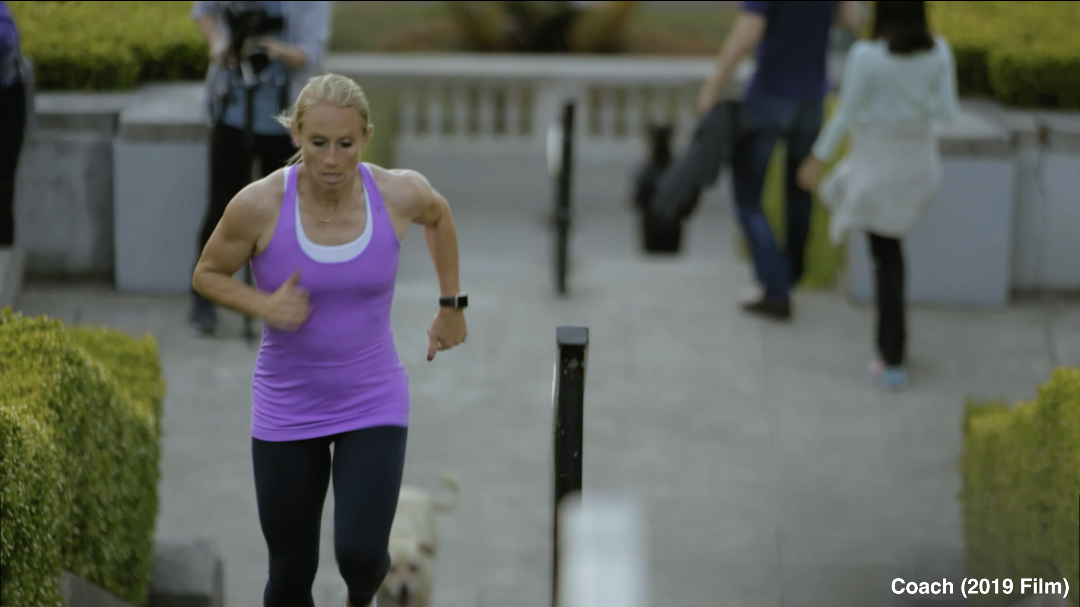
How important is it for women to have women as coaches and in positions of authority in their sport of choice?
Having female role models is essential because you’re seeing someone that looks like you doing what you want to do. And that’s a really powerful image. My assistant coach when I was playing at Cal really was the driving force behind me wanting to be a coach in a lot of ways. She perfectly balances the work hard, play hard mentality, and that’s certainly how I operate. And she did it with such grace and effectiveness and fun and passion.
I’ve played for many male coaches that I’ve loved playing for, but nobody inspired me quite the way she did because I could actually see her. It was a tangible example of what I want to be and who I want to be. So, it’s incredibly motivating to have another female in a position to effect change and to inspire young female athletes to pursue their dreams.
How can the soccer community and allies within that community help effect change leading to more women in positions of authority?
One of our biggest issues in this game is female coach retention. A lot of women want to coach but they have a poor experience, or they don’t feel like they’re qualified, or they’re not given an opportunity.
There’s a lot of different reasons that go into that, but one of the best things advocates and allies can do is really set women up for success and put them in environments where it’s right for their level. And that’s something really important. But we should also mentor them because women, we expect ourselves to know everything, and if we don’t know everything then we’re not qualified or we shouldn’t be here or we’re not ready. No one knows everything, and no one should know everything. That’s part of growing and learning and developing.
Putting young female coaches in environments where they’re going to be successful and pairing them to the right level of club and responsibility is really important because then you gain confidence from doing your role well. And having males that are typically in positions of power and authority can help effect change in such a positive way by providing mentorship and making sure the women in their clubs or colleges align with female coach retention. Make them comfortable. Give them an environment where you’re approachable.
It’s OK to ask questions, it’s OK to be vulnerable, it’s OK to not know everything. You don’t want to start where you want to finish. And that’s something just women in general, we think we have to check every box, which is impossible when you’re just starting out.
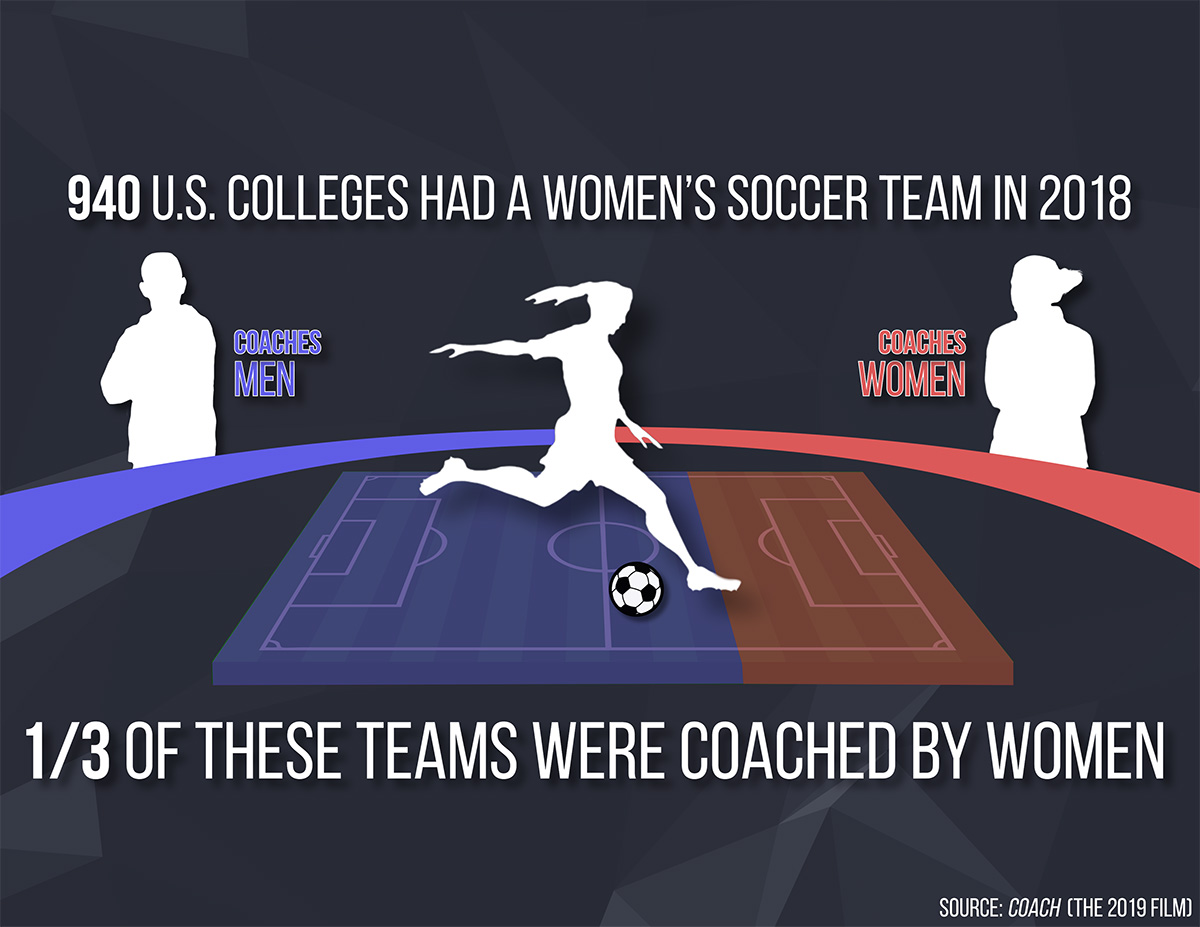
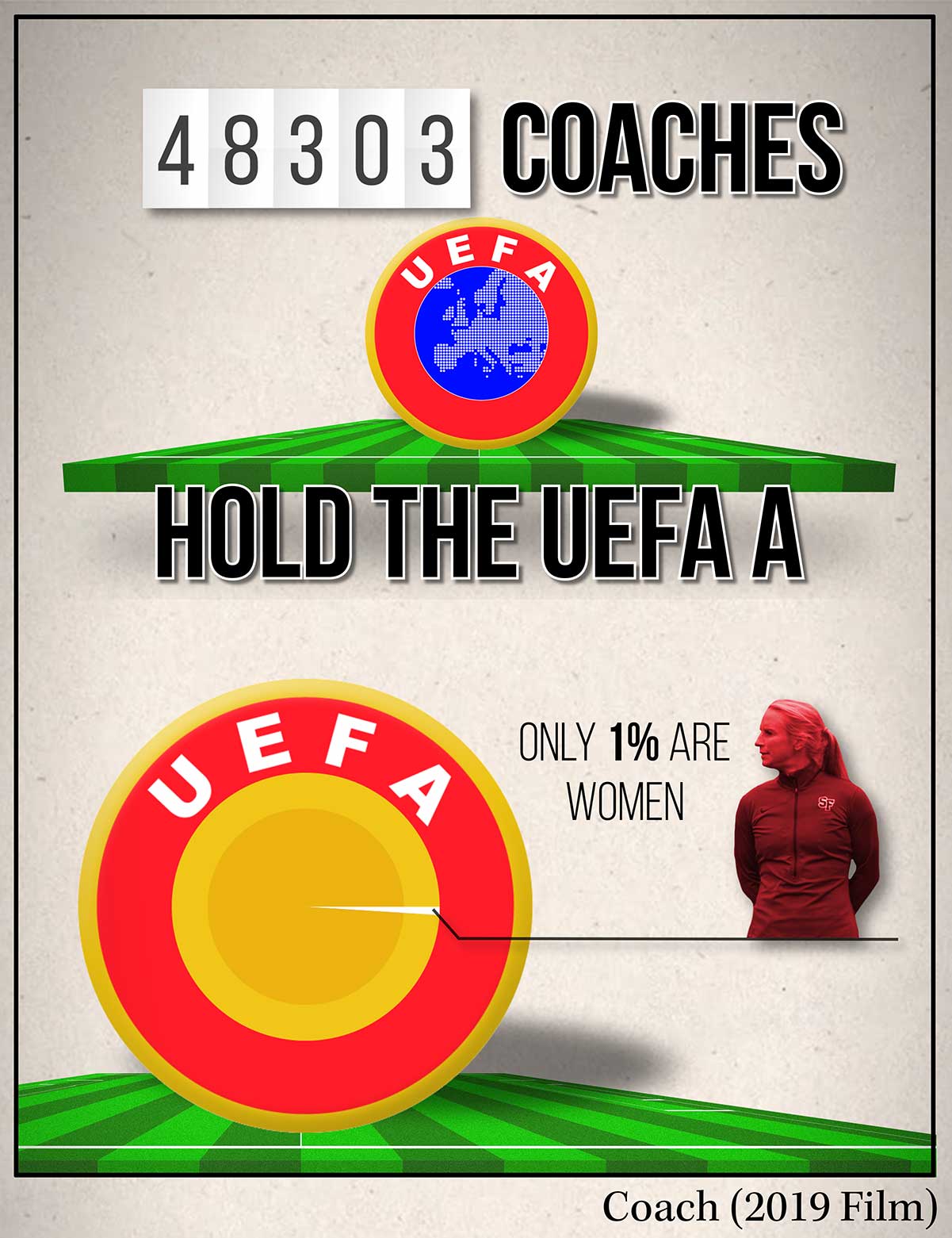
What was your favorite part of the documentary?
Honestly, my favorite part was probably the very beginning. You don’t get to see the whole clip of me reading the poem, but the reason I got so emotional reading that was because I forgot I had written it, and I had not read it again until that moment.
They kept it from me, and I didn’t remember writing it. And that part wasn’t explained, so it was fun for me to read that and to think about, or just reflect on how passionate I was about the game when I was 12 years old, and knowing how passionate I still am about it. It just gave me personal perspective on why I’m doing what I’m doing. There was a deep seated love for coaching and soccer and being on the field that has lasted over 25 years at this point. And I know having that much love for this game is just going to continue to grow throughout my career.
What was it like seeing yourself on the big screen?
It gets easier every time to some degree. Now it kind of feels like I’m watching someone else just because I’ve seen it so many times. But it’s awkward, it’s uncomfortable. It’s definitely weird hearing your own voice too. But it’s cool for me to be able to look back on my experience and kind of re-live it.
It doesn’t matter how many times I watch it, I still tear up when I’m in the taxicab on the way home. I have a physical response because it was such a powerful moment for me and it’s something I’ll never forget, leaving the building and getting in that car and driving away from the facility and just feeling so proud of myself that I had accomplished something that had been so challenging. And to overcome that and survive it and be better for it was really special.
If you wanted someone to have one main takeaway from this film, what would it be?
I think it’s going to be different for men and women and young players and older players, but really just to gain perspective on what your role is in helping elevate the women’s game.
I hope it gives men that are directors of coaching or technical directors or other coaches the urge to reflect on how they can advocate and mentor women to be successful and to stay involved in the game. I hope that it gives women an inspiration to also stay in it and to continue to break glass ceilings and push the barriers and overcome obstacles. And I hope for young players, they love the game and it gives them passion and motivation to become students of the game and to consider coaching and staying involved also once their careers are done.
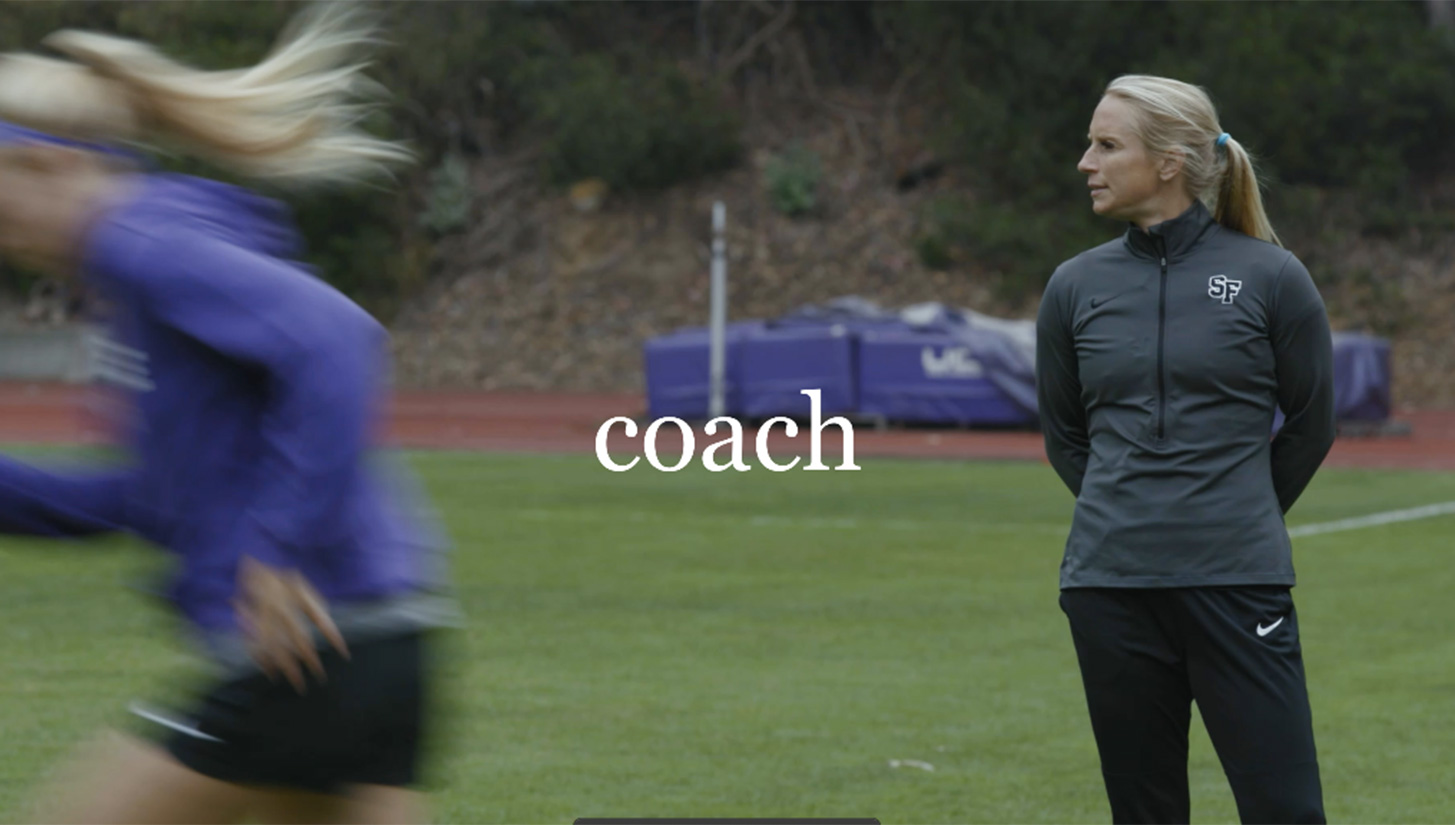
You’re the head coach at UC Davis now, how have you been dealing with the pandemic?
I’ve approached it like everything I’ve done my whole life, just trying to embrace the challenge and look at it as an opportunity more than anything else. There’s good days and bad days like everybody I’m sure, but I challenge my team to think about their own accountability. That’s what is exciting for me, is when we return to pre-season in August, it’s going to be very clear the players who are passionate, put in the work, are holding themselves to a super high standard so they’re ready to rock as soon as the whistle blows.
And in that way, it’s going to reveal a lot of character, integrity, and respect for teammates and who comes out on top and who comes out ready. We’ve provided different exercises and did a lot of team meetings and Zooms and lots of discussion and trying to stay involved in each other’s lives because at the end of the day, that’s what we miss most. We miss being on the field of course, but we also just miss each other. That’s the best part of being on a team — physically being able to laugh and share in our love for the game and tell jokes and have a good time and enjoy each other’s company on and off the field.
You can watch Coach in its entirety for free until July 15 via the film’s official website. Be sure to follow it on Instagram and Twitter to stay up to date on its latest news.
Interview edited for clarity and brevity. Photos courtesy of Coach.








